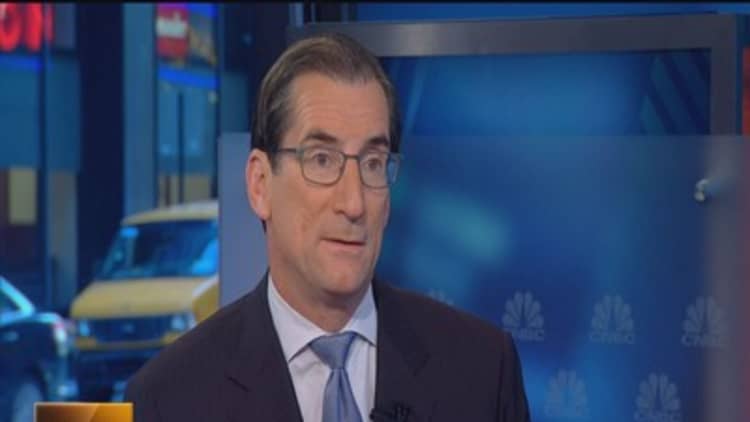If you're looking for signs that the stock market correction is seeping into the start-up world, you won't find it here.
Tanium, a security software company, said Wednesday that it raised $120 million, just five months after bringing in $52 million. Its valuation over that stretch doubled to $3.5 billion, making Tanium the fifth-most valuable private software company, according to The Wall Street Journal's list of billion-dollar start-ups.
The round was led by public market heavy hitters TPG and T. Rowe Price, along with late-stage venture firm Institutional Venture Partners.
Read MoreHow this security start-up joined the unicorn club
While terms of the deal were set independent of the market downdraft that started two weeks ago, TPG's Bryan Taylor said nothing about it gave his team pause.
"We're pretty long-term strategically focused when we make decisions like this," Taylor said. "A week of market volatility even followed by another couple more weeks of market volatility wouldn't change that."
According to Tanium co-founder and Chief Technology Officer Orion Hindawi, investors have been more drawn to his business of late in part because of concerns over froth in the private markets. As a profitable business with $150 million in the bank before the latest financing, Tanium has proven that its business is sustainable even if the capital markets dry up, he said.

Tanium's selling point is that existing security solutions either don't work or require customers to make too many purchasing decisions.
Rather than focusing on firewall protection, antivirus software and a host of other solutions, Tanium's technology is designed to span across entire corporate networks so I.T. managers can locate and fight off hackers after they've entered the doors. Tanium refers to it as "15-second visibility and control."
Over half of Fortune 100 companies are using Tanium, and new customers since its last financing round include Intuit and Verizon. Hindawi, who started the company with his dad, David, in 2007, said the average client, whether corporate or government, spends $1.8 million a year with Tanium, up from $1.1 million last year. Revenue in 2015 will exceed $200 million, he said.
When Tanium raised its first outside round from Andreessen Horowitz last year, it had 35 employees. Headcount has since soared to 320.
Read MoreCyberthreat investments soar along with attacks
"A lot of people are waking up to the fact that adversaries attacking them, especially on the federal side but also on the commercial side, are really getting what they want very quickly," Hindawi said. "There's an awareness that the existing tool sets they've been using are completely failing them."
Hindawi said it made sense to raise the capital now to create an extended cushion and to potentially be able to acquire some security businesses that he expects to suffer in the coming months. He also wanted to bring public market investors on board so the company can start to gear up for an eventual IPO.
"It's really good to have that voice in the room," he said.
Tanium isn't the only company pulling in a large financing round amid the stock market turmoil. Apttus, a developer of sales software built on top of Salesforce.com's platform, announced on Tuesday that it raised $108 million to go after new customers in areas including manufacturing, life sciences and financial services. The financing puts Apttus into the billion-dollar club.
Read MoreGuess who a tech downturn hurts the most
Kate Mitchell, a partner at Scale Venture Partners, told CNBC on Tuesday that "if the public markets are the hare, we're the tortoise."
While a stock market route will likely have an impact on start-up investing, Mitchell said it could be beneficial to traditional venture investors by bringing down valuations and scaring off some of the new big money funds.
"A lot of investors that have been playing in the public markets have moved over to the private markets to get growth," Mitchell said. "Those tourists are going to go home, and I think that means there will be a better balance of supply and demand in our markets."


